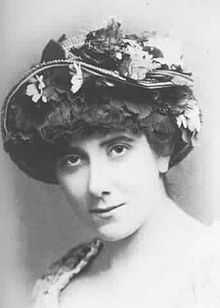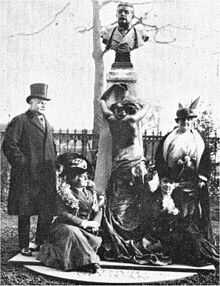Leonora Braham

Leonora Braham (3 February 1853 – 23 November 1931), born Leonora Lucy Abraham, was an English opera singer and actress primarily known as the creator of principal soprano roles in the Gilbert and Sullivan comic operas.
Beginning in 1870, Braham starred for several years in the intimate musical German Reed Entertainments in London. In 1878, she moved to North America, where she continued to perform in comic opera. After returning to England, she was engaged by the D'Oyly Carte Opera Company, creating five of the principal soprano roles in the hit series of Gilbert and Sullivan operas, including the title role in Patience (1881), Phyllis in Iolanthe (1882), the title role in Princess Ida (1884), Yum-Yum in The Mikado (1885), and Rose Maybud in Ruddigore (1887). She also played Aline in the first revival of The Sorcerer (1884–85).
After leaving the D'Oyly Carte company, Braham continued to perform in England and widely on tour, starring in comic opera and grand opera in Australia, South America and South Africa. By the mid-1890s, she returned to Britain, playing in musical comedy and light opera, briefly rejoining the D'Oyly Carte Opera Company. She then continued to perform until 1912 in Britain and America, including with Lillie Langtry in plays without music.
Life and career
Braham was born into a Jewish family in Bloomsbury, London.
Early career

Braham's first professional stage appearance was at St. George's Hall, London, in 1870, in a revival of Gilbert and Clay's Ages Ago. Mr. and Mrs. Thomas German Reed, the producers, starred with Braham.[1] Braham received encouraging notices.[2] She continued performing for the German Reeds for several years, but moved to Montreal with her first husband, Frederick E. Lucy Barnes, in 1878. In April 1878, Braham had won the Llewelyn Thomas gold medal competition at the Royal Academy of Music.[3] In 1879, she played the title role in Gilbert and Clay's Princess Toto in New York and then in Boston. The theatrical newspaper The Era wrote that she gave "a most excellent performance, both vocally and histrionically. She has a sweet, light soprano, finely cultivated, and executed very effectively".[4] In 1880 she was engaged in Alfred Cellier's The Sultan of Mocha, playing the role of Dolly, in New York.[1] Her husband committed suicide in 1880 in North America.[5]
Principal D'Oyly Carte soprano
When she returned to England, Braham briefly rejoined the German Reeds[1] and was also performing in concerts.[6] She was soon chosen to create the title role in Gilbert and Sullivan's Patience at the Opera Comique with the D'Oyly Carte Opera Company in 1881, in which she again received excellent notices.[7] She remained the company's principal soprano until 1887, creating the roles of Phyllis in Iolanthe (1882), Princess Ida in Princess Ida (1884). She was initially cast to sing the role of Lady Psyche in the latter opera, but was promoted during the rehearsal period, when the original choice for the part, American Lillian Russell, had a disagreement with W. S. Gilbert and was dismissed. Braham, generally regarded as a light lyric soprano, nevertheless received good notices in the demanding role.[8]

She played the leading role of Aline in The Sorcerer in the 1884–85 revival. In 1885, she created the part of Yum-Yum in The Mikado, perhaps her best known role.[1] The Era reported that "Miss Braham has in the part of Yum-Yum full opportunities for displaying those powers of finished acting and accomplished vocalism which have long since won for her the friendly admiration of all habitues of the Savoy."[9] She next created the part of Rose Maybud in Ruddigore (1887).[1]
Braham's struggles with alcoholism are portrayed in the 1999 film Topsy-Turvy, and during the run of The Mikado she was threatened with dismissal for this reason. During the summer of 1886, she secretly married J. Duncan Young, previously a principal tenor with the company, and Carte soon had another reason to dismiss the actress. In early 1887, shortly into the run of Ruddigore, Braham finally informed Carte that she was pregnant with her second child,[8] a daughter, born on 6 May.[10] This was not acceptable, particularly as the chorus sings to her prim and proper character in Ruddigore, Rose Maybud, "Rose, all glowing with virgin blushes, say – Is anybody going to marry you today?" She shortly left the Savoy, and Geraldine Ulmar was hastily called back from America to assume the role.[11] Braham created more of the Gilbert and Sullivan heroines than any other soprano, and she was the only English soprano to create more than one such role.[12]
Peripatetic performer
Braham, her husband and children travelled to Australia later in 1887, appearing there in a number of operas including Princess Ida, H.M.S. Pinafore, The Mikado, Patience, and Iolanthe[1] with J. C. Williamson's opera company (along with other ex-D'Oyly Carte players such as Alice Barnett) and in Alfred Cellier's Dorothy, in the title role.[13] The Argus of Melbourne wrote, of her first Australian performance, that she was "Petite in form, animated and graceful in bearing, displaying colloquial tones of sonorous quality and polite inflexion, and having a singing voice both sweet and full, and of high soprano range. Miss Braham got through an arduous first appearance with complete success." She performed again in England from 1888 to 1890, in London and in the provinces, in works other than Gilbert and Sullivan[1] including a substantial run in Gretna Green at the Comedy Theatre (1889–90), together with her old Savoy colleague Richard Temple.[14]
In 1890, and then again in 1891–92, Braham and her family (including two children under the age of four), together with other D'Oyly Carte regulars, including R. Scott Fishe, toured South America with the Edwin Cleary Opera Company, entertaining audiences in Buenos Aires, Montevideo, Valparaiso, Lima, Rio de Janeiro and other cities. Braham played Yum-Yum in The Mikado, Mabel in The Pirates of Penzance, Aline in The Sorcerer, the title roles in Patience, Dorothy, Erminie and Pepita, and in Billie Taylor.[15] Braham received generally good notices. The Standard said of her Dorothy in Buenos Aires, "if her portrayal of the wayward English heiress is not perfect, then I say emphatically there is no perfection in this imperfect world."[16] The company was shipwrecked off the west coast of South America in the middle of the tour, losing most of their possessions (but no lives were lost), and Braham's husband injured his arm.[17] Even after this experience, Braham and family soon braved the dangers of ocean travel to tour for two years in South Africa, performing in the Gilbert and Sullivan operas and other light operas[1] and grand opera, such as Pagliacci and Cavalleria rusticana.[18]

In 1895 Braham was engaged at Daly's Theatre in London in the hit Edwardian musical comedy An Artist's Model.[19] She again rejoined D'Oyly Carte in 1896, playing Julia Jellicoe in a tour of the last Savoy opera, The Grand Duke. During part of this tour, she also played Phoebe in The Yeomen of the Guard and Yum-Yum in The Mikado.[20] This was her last engagement with the D'Oyly Carte company.[1]
Later career and retirement
Braham continued to perform, from 1897 to 1912, in London, the British provinces, and New York.[1][21] On Broadway, she played Donna Adelina Gonzales in Because She Loved Him So at Hoyt's Theatre in 1899.[22] She toured with Lillie Langtry in plays without music.[18] The following year, she toured in Britain with a company using the name of the German Reed Entertainments.[23] Together with George Power, Jessie Bond and Julia Gwynne, she was one of four artistes of the original D'Oyly Carte Opera Company who attended a reunion at the Savoy Hotel in 1914. The four then posed for a group photograph beside the Sullivan monument in the Victoria Embankment Gardens.
She continued to be interested in Gilbert and Sullivan during her retirement, writing of her G&S experiences in "Happy Wanderings of a Savoyard," published in The Gilbert & Sullivan Journal in October 1926. Together with Jessie Bond and Sybil Grey, she participated in March 1930 at the Gilbert & Sullivan Society in a 45th anniversary reunion of original "Three Little Maids from School."[24] Braham faced poverty during her last years, when her husband was confined to a mental hospital.[1]
Braham died in London in 1931 at the age of 78.[18]
Notes
- ↑ 1.0 1.1 1.2 1.3 1.4 1.5 1.6 1.7 1.8 1.9 1.10 Stone, David. "Leonora Braham", Who Was Who in the D'Oyly Carte Opera Company
- ↑ Includes a quote about Braham from a review of Ages Ago.
- ↑ The Times, 16 April 1878. p. 10, col. F
- ↑ "The Drama in America". The Era, 11 January 1880, reprinted at The Gilbert and Sullivan Archive, accessed 8 July 2010
- ↑ Information about Braham's first husband
- ↑ The Times, 12 February 1881, p. 4, col. D
- ↑ review of Patience
- ↑ 8.0 8.1 Profile of Braham, Memories of the D'Oyly Carte website
- ↑ "The Mikado at the Savoy", The Era, 12 September 1885, p. 9
- ↑ The Times, 10 May 1887, p. 1, col. A
- ↑ Information about Braham's second husband, J. Duncan Young
- ↑ Ainger, p. 445
- ↑ Information about some performances of Braham in Australia
- ↑ The Times, 5 December 1889, p. 8, col. C
- ↑ Lamb, p. 30
- ↑ Lamb, p. 33
- ↑ Lamb, p. 41
- ↑ 18.0 18.1 18.2 "Miss Leonora Braham, A Noted Savoyard", The Times, 24 November 1931, p. 19, col A
- ↑ The Times, 4 February 1895, p. 8, col. C
- ↑ "The Mikado: Or The Town Of Titipu", The Era, 9 November 1895, p. 8
- ↑ The Times, 13 February 1912, p. 7, col. F
- ↑ Information from the IBDB database
- ↑ Souvenir programme for Mr. and Mrs. German Reed's Entertainments, summer and autumn tour, 1900, Joseph Williams, proprietor, under the direction of Avalon Collard. Joseph Williams, Jr. (1847–1923) had composed music for some German Reed pieces under the name Florian Pascal
- ↑ Wilson and Lloyd, p. 39.
References
- Ainger, Michael (2002). Gilbert and Sullivan, a Dual Biography. Oxford: Oxford University Press. ISBN 0-19-514769-3.
- Ayre, Leslie (1972). The Gilbert & Sullivan Companion. London: W.H. Allen & Co Ltd. ISBN 0-396-06634-8.
- A detailed account of Braham's life and career is contained in a series of articles by Robert Binder in The Palace Peeper, the newsletter of the New York branch of the Gilbert & Sullivan Society, running from October 1982 to April 1983.
- Lamb, Andrew. "Comic Opera Goes Latin-American, 1890–92: Part 2" in The Gaiety, Winter 2006, pp. 29–47.
- Wilson, Robin; Frederic Lloyd (1984). Gilbert & Sullivan – The Official D'Oyly Carte Picture History. London: Alfred A. Knopf. ISBN 0-394-54113-8.